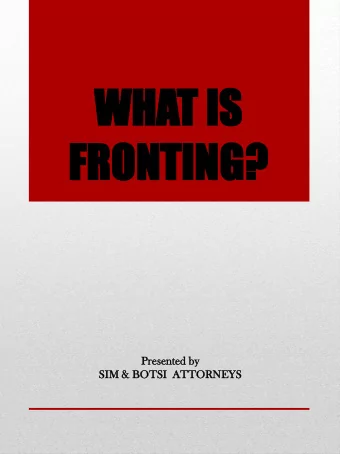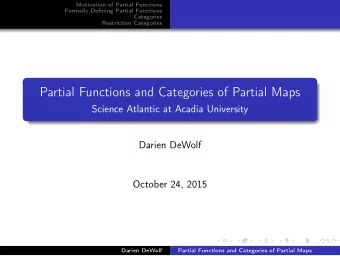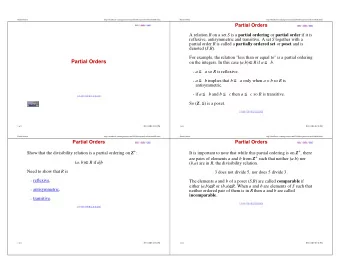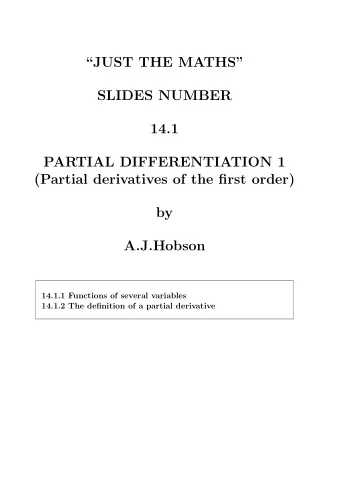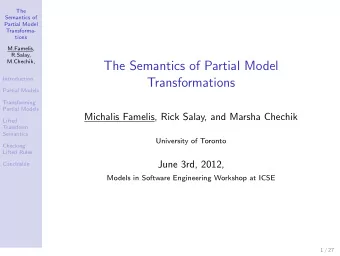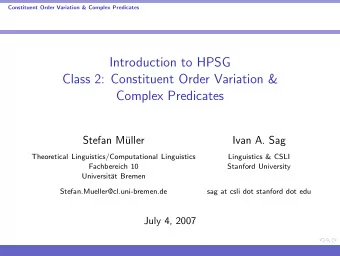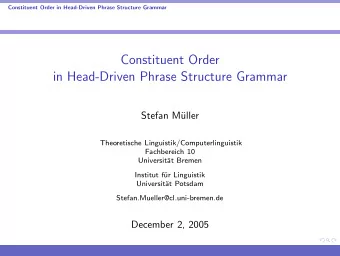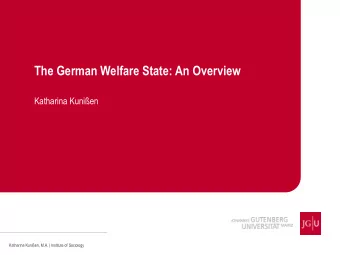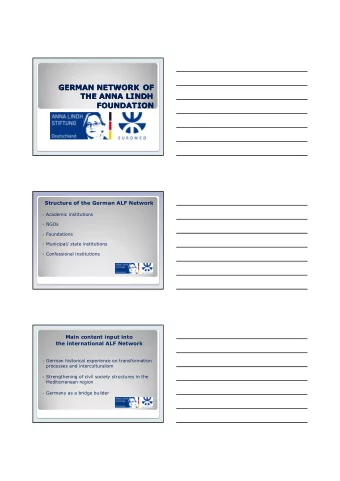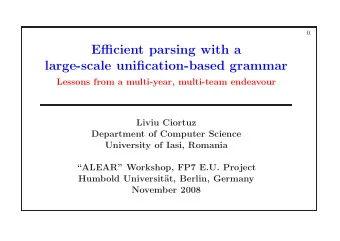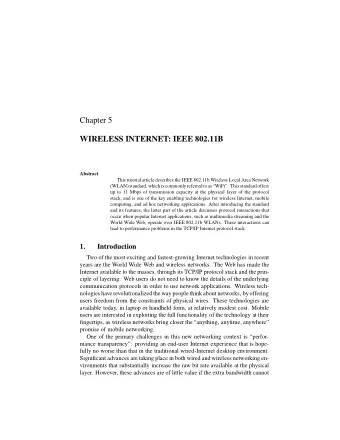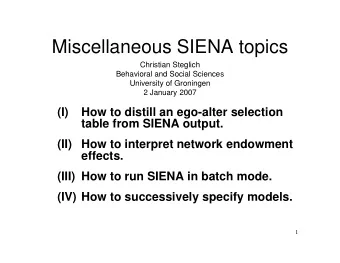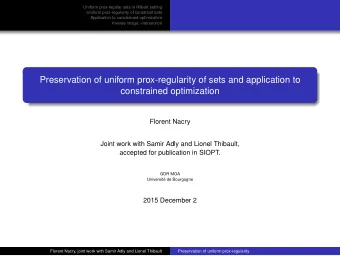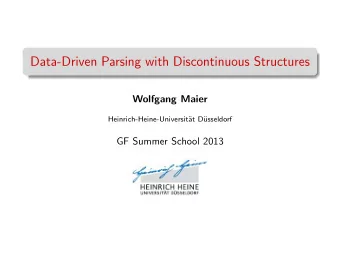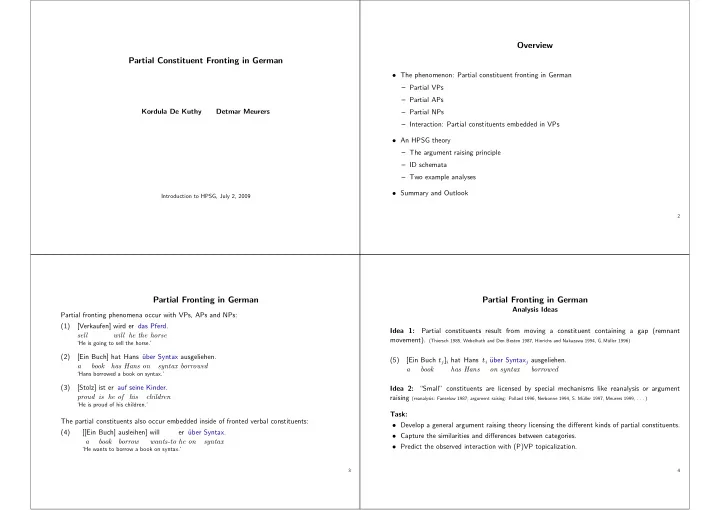
Overview Partial Constituent Fronting in German The phenomenon: - PowerPoint PPT Presentation
Overview Partial Constituent Fronting in German The phenomenon: Partial constituent fronting in German Partial VPs Partial APs Kordula De Kuthy Detmar Meurers Partial NPs Interaction: Partial constituents embedded in VPs
Overview Partial Constituent Fronting in German • The phenomenon: Partial constituent fronting in German – Partial VPs – Partial APs Kordula De Kuthy Detmar Meurers – Partial NPs – Interaction: Partial constituents embedded in VPs • An HPSG theory – The argument raising principle – ID schemata – Two example analyses • Summary and Outlook Introduction to HPSG, July 2, 2009 2 Partial Fronting in German Partial Fronting in German Analysis Ideas Partial fronting phenomena occur with VPs, APs and NPs: (1) [Verkaufen] wird er das Pferd. Idea 1: Partial constituents result from moving a constituent containing a gap (remnant sell will he the horse movement). (Thiersch 1985, Webelhuth and Den Besten 1987, Hinrichs and Nakazawa 1994, G. M¨ uller 1996) ‘He is going to sell the horse.’ (2) [Ein Buch] hat Hans uber ¨ Syntax ausgeliehen. (5) [Ein Buch t j ] i hat Hans t i ¨ uber Syntax j ausgeliehen. a book has Hans on syntax borrowed a book has Hans on syntax borrowed ‘Hans borrowed a book on syntax.’ (3) [Stolz] ist er auf seine Kinder. Idea 2: “Small” constituents are licensed by special mechanisms like reanalysis or argument proud is he of his children raising (reanalysis: Fanselow 1987; argument raising: Pollard 1996, Nerbonne 1994, S. M¨ uller 1997, Meurers 1999, . . . ) ‘He is proud of his children.’ Task: The partial constituents also occur embedded inside of fronted verbal constituents: • Develop a general argument raising theory licensing the different kinds of partial constituents. (4) [[Ein Buch] ausleihen] will er uber ¨ Syntax. • Capture the similarities and differences between categories. a book borrow wants-to he on syntax • Predict the observed interaction with (P)VP topicalization. ‘He wants to borrow a book on syntax.’ 3 4
Partial VP complements More on VP complements II b. Complete verbal complements at the beginning of the Mittelfeld occur for incoherently constructing verbs (8) * Er wird [das Pferd verkaufen] noch heute wollen. I. Partially fronted verbal complements occur only for coherently constructing verbs: he will the horse sell still today want (9) Er wird [das Pferd zu verkaufen] noch heute versuchen. (6) [Zu verkaufen] braucht / versucht / * hofft er das Pferd nicht. he will the horse to sell still today try to sell needs tries hopes he the horse not (10) Er wird [das Pferd zu verkaufen] ihr noch heute empfehlen. ‘He doesn’t need to / try to / hope to sell the horse.’ he will the horse to sell her still today advise II a. Partial verbal complements can never occur at the beginning of the Mittelfeld: III. A complement of the verbal complement can occur at the beginning of the Mittelfeld for coherently constructing verbs: (7) * Er scheint / versucht / hofft [zu verkaufen] das Pferd. (11) Noch heute wird es der Mann [verkaufen] wollen. he seems tries hopes to sell the horse Still today will it the man sell want ‘He seems to / tries to / hopes to sell the horse.’ (12) Noch heute wird es der Mann [zu verkaufen] versuchen. Still today will it the man to sell try (13) * Noch heute wird es der Mann [zu verkaufen] empfehlen. Still today will it the man to sell advise 5 6 Partial AP complements Partial NP complements I. Partial AP complements can be fronted: I. Partial NP complements can be fronted (subject to lexical restrictions, De Kuthy 2001): (14) [Stolz] ist er auf seine Kinder gewesen. = coh. (6) proud is he of his children been (18) [Ein Buch] hat Hans uber ¨ Syntax ausgeliehen. = coh. ‘He was proud of his children.’ (6) a book has Hans on syntax borrowed II. Neither a partial nor a full AP can appear at the beginning of the Mittelfeld: II. A full or partial NP complement can occur at the beginning of the Mittelfeld: (15) * Er ist [stolz] immer auf seine Kinder gewesen. = coh. (19) Er hat [ein Buch uber ¨ Syntax] heute ausgeliehen. = incoh (7) he is proud always of his children been (10 he has a book on syntax today borrowed (16) * Er ist [stolz auf seine Kinder] immer gewesen. = coh. (20) Er hat [nur ein Buch] w¨ ahrend seines Studiums uber Syntax ausgeliehen. ¨ � = verb (8) he is proud of his children always been adj. he has a book today on syntax borrowed III. A complement of the adjectival complement can occur at the beginning of the Mittelfeld: III. A PP complement of the nominal complement can occur at the beginning of the Mittelfeld: (17) Er ist auf seine Kinder immer [stolz] gewesen. = coh. (21) Er hat uber ¨ Syntax w¨ ahrend seines Studiums [kein einziges Buch] ausgeliehen. (11 = coh. he is on his children always proud been (11 he has on syntax during his studies not a single book borrowed Conclusion: analyze AP complements analogous to the verbal complements of obligatorily coherent verbs. Conclusion: NP complements with PP arguments do not pattern with VP/AP complements. 7 8
Embedded partial constituents Embedded partial constituents (cont.) The partial constituents also occur embedded inside of fronted verbal constituents, which can also Fronting only the complement of a complement together with the embedding verb is be partial: ungrammatical: (22) [Verkaufen m¨ ussen] wird er das Pferd. (25) * [Das Pferd m¨ ussen 2 ] wird 1 er verkaufen 3 . sell have-to will he the horse the horse have-to will he sell ‘He will have to sell the horse.’ (26) * [Auf seine Kinder gewesen 2 ] ist 1 er stolz 3 . (23) [Stolz gewesen] ist er auf seine Kinder. of his children been is he proud proud been is he of his children * [¨ (27) Uber Syntax ausleihen 2 ] will 1 er ein Buch 3 . ‘He was proud of his children.’ on syntax borrow wants-to he a book (24) [Ein Buch ausleihen] will er ihr ¨ uber Syntax aber nicht. a book lend wants-to he her on syntax but not ‘But he does not want to lend her a book on Syntax.’ 9 10 Argument Raising Lexical entries for (in)coherent verbs • obligatorily coherent 2 ˙ ¸ 3 phon wollen (28) [H¨ oren wollen] wird er das Meer. " # 6 verb 7 6 7 synsem | loc | cat | head 6 7 hear want will he the sea vform bse 6 7 6 7 2 " # 3 6 7 verb 6 * + 7 4 loc | cat | head 6 7 How can the subcategorization requirement of the main verb h¨ oren can be linked to the occurrence ˆ ˜ loc | cat | head noun vform bse arg-st , 6 7 6 7 5 4 5 of the object das Meer in the Mittelfeld ? lex + • optionally coherent ⇒ Argument raising adds the unsaturated subcategorization requirements of the verbal 2 3 ˙ hoffen ¸ phon complement to the subcategorization requirements of the verbal head. " # 6 7 verb 6 7 synsem | loc | cat | head 6 7 vform bse 2 phon ˙ wollen ¸ 3 6 7 6 7 6 * " " # # + 7 2 2 " # 3 3 6 7 verb verb 6 7 * + ˆ ˜ 6 7 loc | cat | head noun loc | cat | head 4 arg-st , 5 4 head 6 7 vform zu-inf synsem | loc | cat | val | comps 1 ⊕ 4 loc | cat 6 6 vform bse 7 7 6 7 5 5 4 5 val | comps 1 11 12
Lexical entries for transitive verbs Lexical entries for (in)coherent verbs (cont.) • obligatorily incoherent 2 ˙ ¸ 3 empfehlen phon " # • verb selecting an adjectival complement: 6 7 verb 6 synsem | loc | cat | head 7 2 3 6 7 � sein � vform bse phon 6 7 6 7 " # " # 6 7 6 2 3 7 verb verb 6 7 * + synsem | loc | cat | head 6 7 4 loc | cat | head 6 7 6 7 vform bse ˆ ˜ loc | cat | head noun 6 vform zu-inf 7 6 7 6 arg-st , 7 6 7 5 4 5 * " # + 6 7 loc | cat | head adjective lex − 6 7 ˆ ˜ loc | cat | head noun arg-st , 4 5 + lex • verb selecting a nominal complement: 2 3 � ausleihen � phon " # 6 7 verb 6 7 synsem | loc | cat | head 6 7 vform bse 6 7 6 7 D E 4 5 ˆ loc | cat | head noun ˜ ˆ loc | cat | head noun ˜ arg-st , 13 14 The Lexical Argument Raising Principle Coherent verbs as argument raising sources Basic Version The two lex specifications (adjectival and verbal argument-raising sources are lex + ˜ , and raised ˆ " # 2 word 3 2 ˙ ¸ 3 subj 1 s | l | c | v complements ˆ ˜ ) ensure that verbal or adjectival heads from which arguments have been lex − " # 5 → comps raised ` ´ ⊕ 2 verb 6 7 6 3 7 4 s | l | c | head 4 5 raised cannot be raised themselves. vform bse arg-st ˙ ¸ ∧ ` 3 � indep ´ 1 | 2 (29) daß er sie [ansehen 3 k¨ onnen 2 ] muß 1 that he her see can must Argument Raising Sources: Independent Arguments: ‘That he must be able to take a look at her.’ raised ` ´ �� := �� indep := �� * + 0 2 3 1 » l | c | v | comps �� – lex + * + indep := | indep raised » head verb ∨ adj – A := 1 indep − B 6 7 C lex l | c @ 4 5 v | comps 1 * " # + ! » head – noun raised l | c := 1 indep v | comps 1 15 16
Recommend
More recommend
Explore More Topics
Stay informed with curated content and fresh updates.

